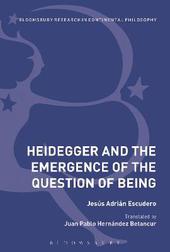
|
Heidegger and the Emergence of the Question of Being
Paperback / softback
Main Details
Description
Heidegger and the Emergence of the Question of Being offers a new, updated and comprehensive introduction to Heidegger's development and his early confrontation with philosophical tradition, theology, neo-Kantianism, vitalism, hermeneutics, and phenomenology, up to the publication of Being and Time in 1927. The main thread is the genealogy of the question of the meaning of being. Alongside the most recent scholarly research, this book takes into account the documentary richness of Heidegger's first Freiburg (1919-1923) and Marburg (1923-1928) lectures, conferences, treatises and letters and addresses the thematic and methodological richness of this period of Heidegger's intellectual life, and offers a coherent and unified interpretation of his earlier work. This book conveys Heidegger's thought in a well-organized, impartial manner, without deviating too far from Heideggerian vocabulary. It will be invaluable for upper level undergraduates, graduate students of philosophy, studying phenomenology, continental and German philosophy.
Author Biography
Jesus Adrian Escudero is Professor of Contemporary Philosophy at the Universidad Autonoma de Barcelona, Spain.
Reviews... this well researched and clearly written volume traces the phenomenological and hermeneutic path from Heidegger's earliest student publications through the period of Sein und Zeit. It should prove useful to beginners and more advanced scholars alike. * Steven Crowell, Rice University, USA * This translation ... is an excellent opportunity for English speakers to benefit from the research of one of today's foremost European Heidegger scholars. Adrian's account of Heidegger's early thought is meticulous, nuanced, and lucid. * Dr Richard Polt, Professor and Chair of Philosophy, Xavier University, USA * An outstanding and very clear study that convincingly shows how Heidegger came to the question of the meaning of Being. It penetratingly restores the unity of his early thought. * Jean Grondin OC, FRSC, Professor, University of Montreal, Canada *
|